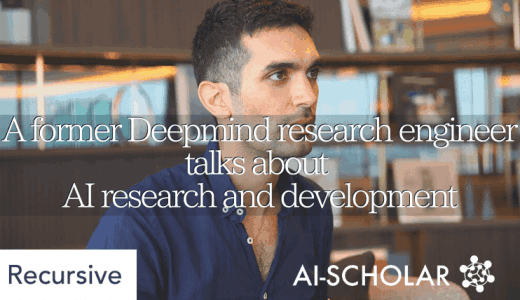Tips For Reading And Writing Papers From A Former Senior Research Engineer At Deepmind
AI-SCHOLAR focuses on research skills for AI papers. Of course, implementation skills and English skills are necessary, but research skills are also necessary. To begin with, it is necessary to have research skills to understand the problem and to research how to solve it, and to think from both technical and business perspectives. Among them, AI-SCHOLAR focuses on the technical perspective. Because if you don't know the technology, it is as if it doesn't exist.
That's why, in order to keep up with the ever-evolving technology of AI, we asked Tiago Ramalho, who worked as a research engineer at Google DeepMind, which is famous for creating the Go AI "AlphaGo" that made a big impression on the whole world. We asked Tiago Ramalho, who founded Recursive, a company focused on supporting AI development to achieve the SDGs in Japan, about the most important aspects of researching and writing an AI paper.
self-introduction
Tiago Ramalho
Tiago Ramalho received his M.Sc. in Theoretical/Mathematical Physics and his Ph.D. in Biophysics from Ludwig-Maximilians-University Munich. After graduation, he joined Google DeepMind. As a senior research engineer, he worked on cutting-edge projects in reinforcement learning, predictive modeling, and self-managed learning, and published numerous papers in international journals such as Nature. Later, he joined Cogent Labs, a multinational AI startup, as a Lead Research Scientist and came to Japan. In August 2020, he co-founded Recursive Inc. and became its CEO.
Tips for reading a paper
Reading papers quickly is essential for a good researcher. Every month there is more and more literature coming out, and it's hard to keep up. Therefore, we should only spend a lot of time on a paper if it's really essential.
The following is my actual method of obtaining information with as little time as possible spent on the paper.
- Follow relevant researchers on Twitter or google scholar
- Follow arxiv and, arxiv-sanity
When a paper title seems relevant, do the following:
- Save citation
- Read abstract
- If the abstract gives an idea of the research (minor improvement), stop.
- If the abstract seems interesting, read all figures and captions.
- If you can get an idea of the paper, stop.
- If you want to understand a bit more, read introduction and methods section, then stop.
- If you need to reimplement the method, read the rest of the paper.
Always try to find open-source code for the paper, it often has details not present in the paper.
Tips for writing a paper
Next are some tips for writing a paper. First of all, of course, you should read a lot of papers. What I recommend is to choose an author you like and imitate his or her writing style.
But that's not specific enough, so here are some things I keep in mind when I write my papers.
- Start writing the paper skeleton as soon as possible.
- Also, write out ideas and motivations as you do the research, these will be helpful as a basis for your writing later on.
- Create the images first. That's what most people will absorb.
- Write the abstract after the rest of the paper.
- Pick your favorite author, and mimic their style of writing.
- Always write a summary of contributions at the end of introduction.
- Spend a lot of time explaining the problem. What is the problem that is being solved, and why is this research useful to solve it.
- If you created a new dataset to test your hypothesis, explain why it's different than existing datasets and why it was necessary.
- If possible, share a link to the source code of the experiments.
And finally, the most important thing is to keep your writing as simple as possible. It doesn't matter if it's a paper or not, but break long sentences into smaller sentences.
The abstract is the last part of the paper because it is the key to whether many readers will continue reading the paper or not. Make sure that the flow of the paper is neat and clean, with important points such as images, issues, and contributions so that the reader can easily understand the content after reading.
Categories related to this article






